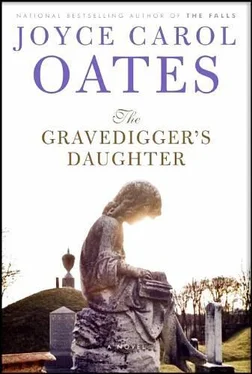He wasn’t listening to their voices. Eyes shut tight in concentration. The fingers of his right hand picked out the predominant pattern as if already it was familiar to him, the fingers of his weaker left hand provided chords, a filling-in of gaps in the sound. Play. Playing. This was happiness! The old piano’s notes running through him-fingers, hands, arms, torso-like an electric current.
“Ask can he play ”Cumberland Breakdown.“”
Mommy told them he could not. He could only play songs he’d heard on the jukebox.
“”Rocky Road Blues‘? That was on the jukebox.“
He was discovering that he could play a cluster of notes and then replay it as an echo, in a different key: raised by a half-note, or lowered. He could change the pattern of the cluster by playing the notes faster or slower or with emphasis upon certain notes and not on others, yet the pattern remained recognizable.
He could not reach a full octave of course, his hands were far too small. He could not reach the pedals of course. Had no idea what the pedals were. Nor would his mother know. The piano-sounds were choppy, broken up. This was not the smooth music you heard on the radio.
The men who’d been drawn by the child’s piano playing began to lose interest. Began to drift away. Soon their loud voices resumed, their braying laughter. One man remained, and came closer. He placed his foot on the right-hand pedal and depressed it. At once the choppy sounds melted into one another.
“You need the pedal. You pump it.”
This man, a stranger. But not like the others. He was smiling, he’d been drinking but he knew something the others didn’t know. And he cared, he appeared to be genuinely interested in the child fumbling to play an instrument he’d never touched before, astonishing how raw and instinctive the child’s playing was. And there was the child’s young mother holding him in her arms, smiling, so proud, a glisten of madness in her face.
Afterward asking who they were, where they were from. And the young woman said evasively, though she was still smiling, “Oh, up farther north. Nowhere you would know.” And the man persisted, “Try me, honey: where?” and the young mother laughed fixing the man with her calm dark seemingly imperturbable eyes shadowed with tiredness and yet beautiful to him, saying, as if she’d rehearsed these words many times, “Nowhere is where we are from, mister. But somewhere is where we are going.”
A roadside café in Apalachin, New York. Just south of the Susquehanna River and a few miles north of the Pennsylvania border. It was late winter 1960, they had been in flight from Niles Tignor for nearly five months.
It was the first time he’d played any piano. The first time she’d led him to any piano. Possibly she’d been drinking, she had seen the piano shoved into an alcove of the café and the idea came to her as so many ideas came to her now: “The breath of God.”
Not that she believed in any god. Hell, no.
Still there were these wayward breezes, sometimes. Sudden gust of wind. Whipping-wind of the kind she’d grown up with, rushing at the old stone cottage from the vastness of Lake Ontario. A cruel suffocating wind, you could not breathe. Laundry was torn from the line, sometimes the very posts collapsed. But there were gentler winds, there were breezes gentle as breaths. These she was learning to recognize. These she awaited eagerly. These she would guide her life by.
Beyond this night there would be other cafés, taverns and restaurants, hotels. There would be other pianos. If circumstances were right, she would lead her gifted child Zacharias to play. If circumstances were not so right, sometimes she would lead her gifted child Zacharias to play anyway. For he must be heard! His musical gift must be heard!
Each time Zack played there was applause.
You don’t look closely into the motive for applause.
And each time there would be a man who lingered afterward. A man who marveled, admired. A man who had money if only a few dollars to spend on the strange young mother and her spindly-limbed little boy with his pale, intense face and haunted eyes.
Tell me your name, honey . You know mine .
You know my son’s name . That’s enough for now .
No . I need to know your name, too .
My name is Hazel Jones .
“ Hazel Jones.” That’s a pretty name .
Is it? I was named for someone . My parents kept the secret but now they are gone . But one day I will know, I think .
“If we haven’t been killed by now, no reason to think we ever will be.”
She laughed, such delicious wisdom.
Fleeing with the child she had not looked back. This would be her strategy for weeks, months, eventually years. Keeping-going she called it. Each day was its own surprise, and reward: keeping-going was enough. From the house on the Poor Farm Road she’d taken money thrown at her body in contempt of her very body and in repudiation of her love as a naive young wife defrauded in marriage. She had this money, these crumpled bills of varying denominations, she might tell herself she’d earned it. She would supplement it by working when necessary: waitress, cleaning woman, chambermaid. Ticket seller, movie theater “usherette.” Salesclerk, shopgirl. On her knees gracefully slipping shoes onto men’s stockinged feet, Hazel Jones with her dazzling American-girl smile: “Now, sir, how does that feel?”
Frequently men offered to buy her meals, drinks. Her and her little boy. Frequently they offered to give her money. Sometimes she refused, sometimes she accepted but she provided no sexual favors for money: her puritanical soul was revulsed at such a thought.
“I’d rather kill us. Zack and me. And that will never happen.”
She felt no remorse for leaving the child’s father as she’d done. She felt no regret, and no guilt. She did feel fear. In that vague fading way in which we contemplate the fact of our own deaths, not imminent but impending. So long as we keep going, he will never find us .
It did not occur to Rebecca that the man who had beaten her and the child had committed criminal acts. No more would she have thought to flee to Chautauqua Falls police than Anna Schwart would have fled to Milburn police in terror of Jacob Schwart.
You made your bed, now lie in it .
It was the wisdom of peasants. It was a gritty wisdom of the soil. It was not to be questioned.
Her wounds would heal, her bruises would fade. There remained a faint high ringing in her right ear at times, when she was tired. But no more distracting than the springtime trill of peepers or the midsummer hum of insects. There were angry reddened scabs on her forehead she fingered absently, almost in awe, a curious gratified pleasure. But these she could hide, beneath strands of hair. She worried more for the child than for herself, that the child’s father would be maddened with the need to reclaim him.
Hey you two: love ya .
There was Leora Greb shaking her head, saying you don’t step between a man and his kids, if you want to stay alive.
This was Rebecca’s plan: to abandon Tignor’s car in a public place, that it would be found by authorities immediately and its ownership traced and Tignor would come into possession of it and have less reason to pursue her. She knew, the man would be infuriated by the theft of his car.
She laughed, thinking of the man’s rage.
“He would kill me now, would he? But I’m out of his reach.”
She smiled. She touched the scabs at her hairline, that were nearly painless now. She would not speak of Tignor to the child nor would she ever again tolerate the child whimpering and whining after Dad-dy .
Читать дальше












